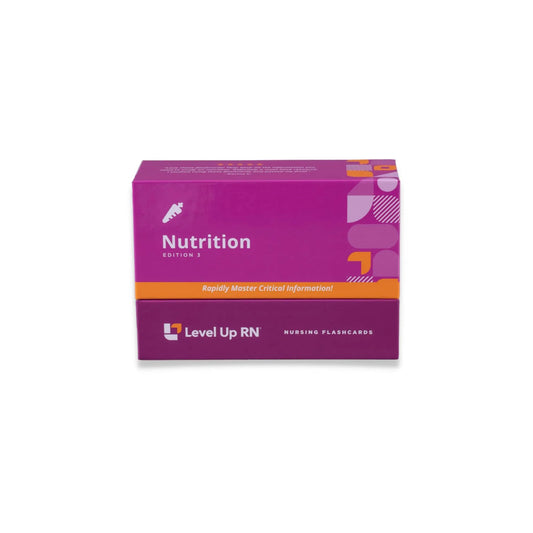Hi, I'm Cathy with Level Up RN. In this video, we are going to be talking about nutritional recommendations for a patient who has had bariatric surgery. And then we are also going to talk about nutritional considerations when caring for a patient with an eating disorder, specifically anorexia nervosa and bulimia nervosa. At the end of the video, I'm going to give you guys a quiz to test your understanding of some of the key points I'll be covering. So definitely stay tuned for that. And if you have our Level Up RN Nutrition Flashcards, go ahead and pull them out, so you can follow along with me.
Bariatric surgery is a procedure that reduces a patient's gastric capacity or absorption. Indications for bariatric surgery include morbid obesity. So a BMI over 40 or a BMI over 35 with other risk factors present. After a patient has bariatric surgery, it is super important to monitor for dumping syndrome, which is a complication caused by rapid gastric emptying. Signs and symptoms of dumping syndrome include abdominal cramping, tachycardia, nausea, diarrhea, and diaphoresis. Patient teaching following bariatric surgery is essential. Patients should be advised to chew their food slowly and completely. They should eat six small meals a day as opposed to three big meals. They should not consume liquids with their meals, but instead consume liquids between meals. A protein-rich diet is recommended, and patients should avoid foods that are high in sugar, fat, and carbohydrates. Patients also need to take vitamin and mineral supplements as directed. And then finally, reclining after meals can help slow gastric emptying.
Let's now talk about nursing care of patients with anorexia nervosa or bulimia nervosa. Anorexia nervosa is an eating disorder characterized by the restriction of calorie intake that results in a dangerously low body weight. To be clear, anorexia nervosa is different than anorexia, which means decreased appetite. Bulimia nervosa is an eating disorder characterized by binge eating, followed by compensation measures to avoid gaining weight, such as vomiting, laxative use, and extreme exercise. In terms of nursing care of a patient with an eating disorder, we want to closely monitor the patient's intake and output. We want to weigh the patient each morning using the same scale. We need to stay with the patient during meals and for at least one hour after meals. We should restrict strenuous activity, and then privileges can be provided based on treatment compliance and/or weight gain. If a patient has inadequate oral intake, then tube feedings may be ordered. It's always important to monitor for refeeding syndrome, which is a complication that can occur when nutrition is introduced too rapidly after prolonged starvation. Signs and symptoms of refeeding syndrome include severe electrolyte imbalances, arrhythmias, and seizures.
All right. It's quiz time, and I've got three questions for you.
Question number one. What complication following bariatric surgery can cause symptoms such as abdominal cramping, tachycardia, diarrhea, and diaphoresis?
The answer is dumping syndrome.
Question number two. After bariatric surgery, patients should consume plenty of fluids with meals. True or false?
The answer is false. Fluids should be consumed between meals as opposed to with meals.
Question number three. What complication can occur when nutrition is introduced too rapidly after prolonged starvation, causing symptoms such as severe electrolyte imbalances, arrhythmias, and seizures?
The answer is refeeding syndrome.
All right. That's it for this video. I hope you learned a lot. Take care and good luck with studying.
[BLOOPERS]
Patient teaching following by.


